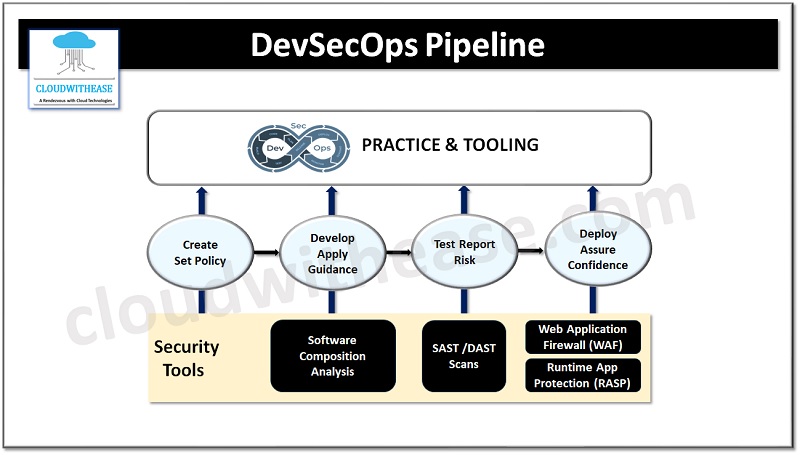Table of Contents
The impact of covid is tremendous on enterprise digital transformation and application modernization on cloud. Before the pandemic era, management concerns were not around making cloud security management a priority and mandate for organization. Now it is imperative to weave security into every stage of the application development domain to build and scale applications at enterprise level along with meeting regulatory and compliance requirements of cloud security. Security is no more an afterthought !
Today we look more in detail about cloud security improvising using DevSecOps philosophy, its benefits, use cases, how it is used etc.
What is DevSecOps?
DevSecOps is integration of ongoing security principles, processes and technology into DevOps practices, culture, and workflows. It brings together the traditional way of working of different departments be it development, operations, information security etc. to ensure software development in a secure manner. DevSecOps also cascades the responsibility umbrella on each and every team member making everyone owner of security be it a developer, a security engineer, or an operations guy.
With DevSecOps, the Security team continuously runs security tests on applications during its life cycle on the cloud. Resulting in making speed, agility, scalability, and security the top most priority.

Current Cloud Security Situation
The latest survey by Gartner shows that over 90% of organizations are struggling to enforce security policies around cloud data due to various reasons which are an add-on to security difficulties. Let’s look at some of them more in detail :
- Tracking and Visibility Deficiencies – Software as a service (SaaS) applications and infrastructure as a service (IaaS) models face challenges of data protection and assets beyond their boundary of control. Cloud service providers do not grant full control of the infrastructure layer to customers and that creates lack of visibility in the security context.
- Broadened Attack Surface – threat factors prime target are organizations using public clouds. It is easy to attack with zero-day, malware, account hijack etc. in the absence of adequate security controls
- Changes in Workloads – Frequent changes in workload to bring scalability and agility, cloud asset provisioning and de-provisioning makes protection difficult.
- Environment Complexity – Hybrid and multi-cloud environments giving rise to security management complexity and need tools and solutions which work together cohesively.
Need for DevSecOps in Cloud Security
DevSecOps is a relatively new concept and built on the foundation of DevOps methodology. DevSecOps adds a security element to Software development life cycle (SDLC) and security becomes an integral part of cloud application development. Security testing and monitoring is embedded in the development process thus making cloud applications much secure from the day of its inception.
DevSecOps teams monitor security of applications throughout the development process till its launch and beyond that. Monitoring. Risk analysis, automation of security measures, and incident management are all embedded in the philosophy of DevSecOps.
Benefits of DevSecOps in Cloud Security
Let’s look at some key benefits of DevSecOps in cloud security:
- Building an open and transparent environment – DevSecOps lead to open communication between multiple teams and business units. Monitoring and tracking of issues commonly across teams lead to addressing security issues in a more efficient manner and make business more resilient.
- Robust security in cost and time effective manner – DevSecOps team work in proactive mode rather than reactive mode and attempt to stop potential threats in the beginning itself rather than dealing with them later. Identification and prevention of events which impact the IT environment and businesses are brought down tremendously with DevSecOps.
- Single data storage for all data – DevSecOps teams can gather all data from varied sources into a creative process called data management and the DevSecOps process suite which enables teams to do speedy enhancements in applications under development. This imposes a smooth CI/CD pipeline for effective delivery and leads to saving significant time during the development cycle.
- Build and testing approach reimaging – automation minimizes the impact of human intervention. And helps technical teams to learn from each other and share experiences to improve team collaboration resulting from digital transformation and migration to cloud. Automatic container and compliance security checks are possible with DevSecOps security toolkit.
- Code analysis – Adoption of agile strategy for security operations leads teams to produce more code in brief, regular release cycles and ensures efficiently managed cloud security and risk management. DevSecOps ensures swift scan of vulnerabilities and incorporates code analysis in the quality control process.
- Automation of testing process – DevSecOps key principle is related to automated tests to streamline testing process by repetitive tests, logging outcome, and continuous feedback to teams. Overall efficiency is increased by removal of code errors.

